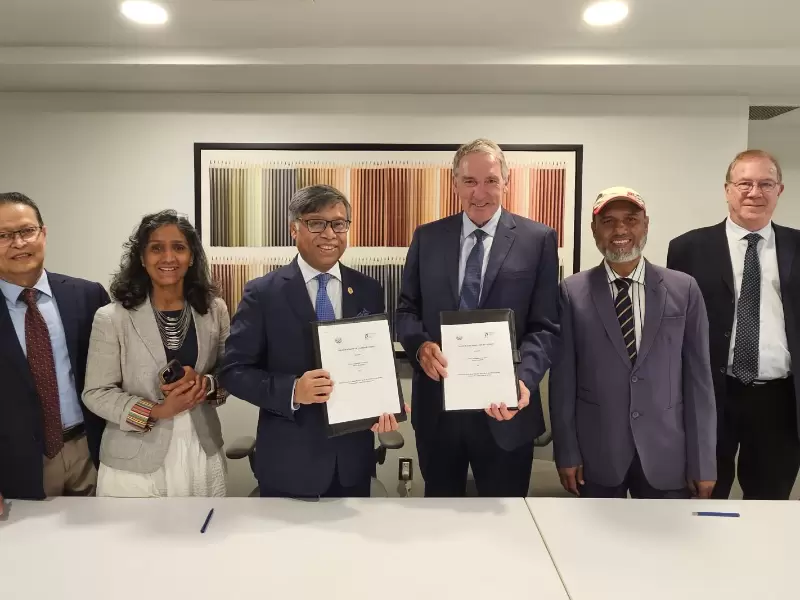West Bengal CM opens Baguiati Rail Pukur Club Durga Puja
The club has chosen “Shabdo” (The Sound) as this year’s theme, focusing on the gradual disappearance of natural soundscapes amid rapid urbanization.
 Celebrations at Baguiati Rail Pukur Club Durga Puja / Courtesy Photo: Ankit Agrawal and Prerna Kothari Forma
Celebrations at Baguiati Rail Pukur Club Durga Puja / Courtesy Photo: Ankit Agrawal and Prerna Kothari Forma
West Bengal Chief Minister Mamata Banerjee on Sept. 23 virtually inaugurated the 72nd Durga Puja of Baguiati Rail Pukur United Club.
The club has chosen “Shabdo” (The Sound) as this year’s theme, focusing on the gradual disappearance of natural soundscapes amid rapid urbanization.
The pandal highlights the fading of bird calls and rustling leaves, with its central attraction being a 20-feet bird installation symbolising both the grandeur of avian life and the silence that follows its decline.
Visitors are introduced to an immersive experience featuring soundscapes and mime performances by Shubhendu Mukhopadhyay and Kaushik Biswas. The performances aim to emphasise ecological concerns and the need to safeguard natural habitats.
 72nd Durga Puja of Baguiati Rail Pukur United Club / Courtesy Photo: Ankit Agrawal and Prerna Kothari Forma
72nd Durga Puja of Baguiati Rail Pukur United Club / Courtesy Photo: Ankit Agrawal and Prerna Kothari Forma“Our theme Shabdo is more than an artistic marvel – it is a wake-up call. The sounds of birds and nature, once inseparable from our daily lives, are fading fast. Through this creation, we hope to inspire action before silence becomes the only sound left for future generations,” said committee member Gourab Biswas.
 Idol of goddess Durga / Courtesy Photo: Ankit Agrawal and Prerna Kothari Forma
Idol of goddess Durga / Courtesy Photo: Ankit Agrawal and Prerna Kothari Forma
The unveiling coincides with a broader effort by Kolkata puja organisers to make pandals more inclusive. Several clubs across the city are incorporating ramps, Braille signage, and dedicated facilities for senior citizens and people with disabilities. Baguiati Rail Pukur United Club has followed suit by arranging resting spaces and accessible features within its pandal.
 The pandal highlights the fading of bird calls and rustling leaves, with its central attraction being a 20-feet bird installation / Courtesy Photo: Ankit Agrawal and Prerna Kothari Forma
The pandal highlights the fading of bird calls and rustling leaves, with its central attraction being a 20-feet bird installation / Courtesy Photo: Ankit Agrawal and Prerna Kothari FormaThe ecological message resonates with wider environmental concerns in Bengal and beyond. Recent mapping of wolf corridors near Durgapur has drawn attention to the pressures of industrial growth on wildlife habitats, while sanctuaries such as Chintamoni Kar, located south of Kolkata, remain crucial in sustaining avian diversity threatened by urban development.
Nationwide, initiatives like the Great Backyard Bird Count are seeing growing participation, underscoring both India’s rich avian life and the warning signs of decline. Scientists are also advancing acoustic biodiversity monitoring methods, which use sound recordings to track species loss—an approach that underscores the importance of listening as well as seeing in conservation.




 Staff Reporter
Staff Reporter















Comments
Start the conversation
Become a member of New India Abroad to start commenting.
Sign Up Now
Already have an account? Login